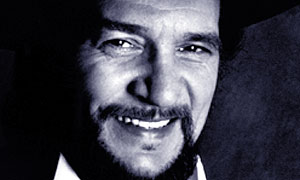
If I'd only known I was gonna live this long/ I might have took better care of myself ~ Waylon Jennings
We hear a lot about Johnny Cash these days, and rightly, but when it comes to pure outlawry and black-assed cool in the swampy lands that lie between country and rock even Cash looked like an amateur next to Waylon Jennings. And yet outside of country music circles Waylon seems to have been all but forgotten. When his son Shooter appeared, playing Waylon, in Walk The Line, I was almost jumping up and down in my seat, but the people I was watching the movie with had no idea who he was supposed to be. I tried to explain, but what the hell. Cash has the public imagination now. And no one would begrudge him his reputation less than lifelong friend Waylon.
This is who he was. A beautiful singer with a distinctive baritone that swung between a wail and a growl. A great guitar player who'd served his apprenticeship in Buddy Holly's post-Crickets band in the late Fifties, just before the fatal plane crash (he was on the last tour and gave up his seat on the plane to J.P.Richardson, the Big Bopper, because Richardson was too heavy to be comfortable on the tour bus). And Waylon was one of country music's great individualists --hence his inclusion in this new series of S.P. profiles. Determined to make music his own way after a series of unsuccessful records in the late Sixties, he went over the heads of the Nashville producers and record executives who controlled every aspect of an artist's career in those days (and probably still do), and did a financially perilous deal with their bosses in New York, under the terms of which he underwrote the cost of producing his own albums on the condition that he could choose his own producer, his own musicians and pick his own songs. The New York execs agreed, and the albums that followed, blending country and rock stylings, incorporating a rock sensibility into lyrics written by younger, realer songwriters like Billy Joe Shaver, broke all records for country music sales and redefined the possibilities of the medium. Waylon even had a stab at songwriting himself in these heady creative days, and when he did he was as good as anybody. His song Are You Sure Hank Done It This Way? linked, correctly, the new long-haired rebels like himself--soon to be termed "outlaws" by the media, though Waylon never liked to be called an outlaw--with the symbolic father of country music Hank Williams, and seemed to be a kind of musical call to arms for all those young enough and daring enough to sweep away the over-moneyed, cynical, unmusical country Establishment: Rhinestone suits and new shiney cars he sings. It's been the same way for years/ We need a change. (You can still feel the sting of that sentiment thirty years on.)
Willie Nelson said once that Waylon disliked the "outlaw" label because for him it was a little too close to the truth. As Walk The Line shows, Waylon had had a capacious drug habit that predated by at least a decade his arrival on the scene as the Daddy of the Outlaws, and once he became a national media figure with a succession of era-defining albums the attention paid to him by the police became intolerable. So of course he wrote about it, and in doing so became more glamorous as a figure of rebellion among the young and the disenfranchised and the terminally different, which of course drew more attention from the police. We were wrapped up in our music/ That's why we never saw/ The cars pull up, the boys get out/ And the room fill up with Law he sings on the splendidly titled Don't Y'All Think This Outlaw Bit's Done Got Out Of Hand.
But eventually he slowed down, as even the biggest lunatics must. And when he slowed down his music lost some of its fire, despite a late resurgence, a few years before Waylon's death, in an album produced by the ubiquitous Don Was.
In Waylon's later years, there seems little evidence, tellingly, of the kind of Born Again spiritual rescue and recanting that made Johnny Cash's work so uninteresting in the Seventies and Eighties. Waylon did quit snorting his money up his nose, but I remember at least one interview where he said it was for the love of his family, rather than out of fear for his own health or his eternal soul. And I for one prefer that. The drug problem, as it is rather puritanically known, will never be beaten until those who wish to beat it acknowledge that getting stoned is fun (and, I would venture to add, a hell of a lot more fun than most of the things they offer as an alternative, like work and duty and two weeks in Spain a year etc. etc. etc.) It's just that eventually, like everything enjoyable, drugs will kill you.
Any cultural amnesiacs who would like to explore Waylon's work might want to start with the Honky Tonk Heroes album and go from there, though anything from Ladies Love Outlaws up to his rather regrettable, financially-motivated participation in The Dukes of Hazzard contains lots of treasures on the wilder side of American music and sentiment. You can cross refer to Willie Nelson's brilliant, and slightly more cerebral, ouevre to get a broader view of the era.
2 comments:
It is useful to try everything in practise anyway and I like that here it's always possible to find something new. :)
She turned over and said Just leave me alone. Gladys looked up at Ginger.
free porn stories an pics
interracial marriage true stories
bestiality stories k-9 thumbs
free erotic incest sex stories
tentacle rape stories
She turned over and said Just leave me alone. Gladys looked up at Ginger.
Post a Comment